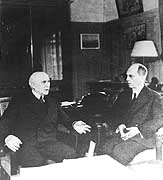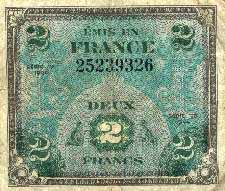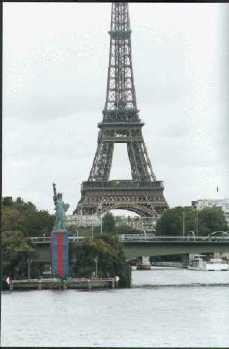|
| French-
American History (#2) |
|
|
|
|
|
| De Gaulle and Gaullism |
|
Major Franco-US squabbles |
|
Many Americans have the
idea of Charles de Gaulle as a man whose only goal in life was
to annoy the USA (read
about it). The truth is different : here are a few facts :
-
After WW1 Charles de Gaulle
understood that the next war would be a mechanical one but nobody
listened to him. In June 1940 he was under-secretary of Defence
and, refusing the armistice with Germany, he went to London and
called for continuing the war with the UK against Germany (Americans
must remember that at this time the USA were NOT at war : the
war was declared only after Pearl Harbor in December 1941, more than two years after its beginning for France in September 1939).
-
De Gaulle thought that France
could not be independent unless she had her own full military
capacity, i.e. nuclear weapons. In spite of the US refusing to
cooperate (by providing computer equipment), France succeeded
in 1963. Then in 1966 she withdrew not from NATO but from NATO's
military organization.
-
De Gaulle was always totally
loyal to the USA in major international crises (for instance
in the Berlin blocus 1948-1949 or the Cuba crisis in 1962)
-
De Gaulle had a vision of the
world that was clearly against the Soviet Union but he did not
want the rest of the world to be one block against the other
: he thought that the world should be multi-lateral, with several
poles, Europe being of course a major one and France enabling
Europe and the world benefit from her special relations with
her former French-speaking colonies. It is a fact that this policy
often opposed the US policy but is also a fact that it was never
driven by the (childish) desire to just provoke
Americans (like many of them believe !)
-
Gaullism is not something new
in French history and it relates to "Bonapartisme"
: an authentic democracy with a strong state and a very active
foreign policy in the name of universal ideas.
-
More about de
Gaulle. Among the many books about de Gaulle (including his
owns), read an excellent book about de Gaulle "off the record"
by Peyrefitte.
|
|
As seen by Americans....
- 1860s : France openly supports
the Confederates in the Civil War
- 1920s : the insistance of France
to receive from Germany the heavy financial compensations resulting
from the Treaty of Versailles (the USA pushed to lighten them)
(but at the same time, the USA demanded France to repay the war
loans) ; several major Franco - American crisis revolved around
debt payment!
- July 1926 : anti-American riots in Paris
- 1940-1945 : very difficult relations
between Franklin Roosevelt and de Gaulle
- 1950s : the French left-wing
(Jean Paul Sartre etc...) and the powerful French Communist Party
oppose the USA and support USSR
- 1960s and de Gaulle : France
withdraws from the military command of NATO (but not from NATO,
as many Americans believe) (1966), Phnom-Penh speech by de Gaulle
against the war in Viet Nam, (1967), de Gaulle supports the autonomist
movement in Québec "Vive le Québec Libre"
(1968)
- 1981 : François Mitterrand
appoints four Communist ministers to his cabinet
- 1993 : in the Uruguay Round (GATT), France succeeds, against US negociators : cultural products are excluded from the negotiation (see "exception culturelle")
- 2003 : Jacques Chirac opposes
the US decision to attack Iraq, generating a wave of French-bashing in the US ("freedom fries", "cheese eating surrender monkeys" etc)
- Read about anti-Americanism
and the Americanization of France
- etc....
As seen by the French.. (read about
the image of America
in French history)
- 1792 : the French new-born Republic,
attacked by all the European kings, seeked help from the USA
that France had helped so much a few years before, in vain (the
USA had a secret agreement with England)
- 1831 : the USA demand (and obtain)
a compensation of Francs 25 m for the economic consequences of
the European blocade by Napoleon
- 1898 : the war with Spain in Cuba
|
DID YOU KNOW THAT.....?
In the US and in France, the same historical events do not have the same name ! For example "the French and Indian War" is called "la guerre de sept ans" (the Seven Year War) by the French, "Bastille Day" is "le Quatorze Juillet" (July Fourteen), "the Civil War" is "la guerre de secession" (the Secession War), "the Revolutionary War" is "la guerre d'indépendance" (the Independence War), etc
.DID YOU KNOW THAT.....?
Up to 1942, that is to say almost two years after de Gaulle called
upon occupied France to join the Allies against Germany on June
18, 1940, the US government still maintained diplomatic relations
with Berlin, an ambassador in Vichy (Admiral Leahy) and
relatively good relations with Vichy. During this very long period,
the relations between de Gaulle and the US government were minimal,
It is interesting to recall (few Americans know it) that on December
24, 1941, the small French archipelago of Saint-Pierre et Miquelon (off Newfoundland) voted
to join de Gaulle's Free France and fight in the Free French
Forces : in an ultimatum, Secretary of State Cordell Hull demanded
the return of the Vichy Governor. Roosevelt kept supporting de
Gaulle's opponents within the Free French organization and he
survived politically only thanks to the faithful support he got
from Churchill. It is fair to say that de Gaulle was not easy
to live with (this is an understatement...) ; Churchill 's envoy
to France, Major-General Edward Spears.said "Of all the
crosses I have had to bear during this war, the heaviest has
been the Croix de Lorraine." (it is the symbol of de Gaulle's
Free French Army).
|
|
- 1919 : the US Congress refuses to sign the Treaty of Versailles and join the League of Nartions
- 1927 : the execution of Sacco
and Vanzetti
- 1940-1942 : the USA maintained
an embassy in Vichy with the French collaborationist government. Read more about the German occupation
of France.
- 1944 : after the Allied landing
in Normandy, the US had planned a US military government in France
(AMGOT) and de Gaulle had to struggle to install immediately
a French civil one
(he was not invited to Yalta a few months later).
- 1953 : the trial of the Rosenbergs
- 1956 : The USA (and USSR) demand
France (as well as Israel and UK) to withdraw from Egypt, ending
the (stupid) Suez campaign
- 1954-1962 : USA openly supports
the anti-French revolt for the independence of Algeria (read how Noam Chomsky talks about it...)
- 1960s : the US refuse to help
France to build her atomic weapons
- 1960s and the American Challenge : the flow of US investment to Europe threatens European firms
- 1967-1968 : US campaign of boycott of French products
to retaliate against De Gaulle's policy
- 2003 : a violent hate campaign
of US govenment and press against France after her refusal to
support the Iraq war. Read about French-bashing
- 2017-2018 : the decisions of the US government are seen as extremely hostile and humiliating toward Europe and of course France (like initiating a trade war, refusing the Paris agreement on climate change and the Iranian nuclear agreement, etc)
- Sept.2021 : the cancellaltion by Australia of a 35 b€ + deal signed in 2016 and the transfer of the contract to US/UK suppliers was seen by the French public opinion as an unacceptable humlliation and a major breach of confidence in the US "ally".
- etc....
DID YOU KNOW THAT.....?
In France nobody has ever heard of "The French and Indian War" (1756-1763) : it is called "La Guerre de Sept Ans" ("The Seven Year War") and the major battles took place in Europe between England and Prussia on one side and France, Austria and Russia (and a few others on either side). When the peace was signed, France abandoned most of her American and Indian colonies. Nobody in France thought it was very important since France kept the richest (at that time) : her Caribbean Islands. Voltaire himself referred at the rest as "a few acres of snow". A very bad deal.....
|
 |
Photo
: US Ambassador Admiral Leahy saying good-bye to Marshall Pétain,
April 27, 1942 (the US government maintained diplomats in Vichy
until November 1942! : for France, it was the third year of the
war...)
(credit)
|
Best-known French people for Americans
Americans like the most (and
consider some of them American) : Jean Jacques Audubon, Jean
Calvin, Pierre Simon du Pont de Nemours, Gilbert Motier de La
Fayette, Alexis de Tocqueville, Jules Verne.
- Jean Jacques (John James) Audubon
(Haïti 1785, New York 1851), emigrated from France to the
USA in 1803 and became an illustrious American naturalist and
painter.
- Jean Calvin (Picardie
1509, Geneva 1564) French theologian and religious reformer emigrated
to Switzerland in 1534.
- Gilbert Motier de Lafayette
(Auvergne 1757, Paris1834) commanded American troops in the Revolutionary
War. His grave in Paris is a landmark
for Americans.
- Pierre Samuel du Pont de
Nemours (Paris 1739, Eleutherian Mills (USA) 1817), entrepreneur
and economist. His son Eleuthere founded the Du Pont de Nemours
and Co.
- Alexis de Toqueville
(Paris 1805, Cannes 1859) ; Americans know him for what he wrote
about America but he also wrote one of the best analysis of the
French Revolution.
- Jules Verne (Nantes 1828,
Amiens 1905) author of science-fiction romances.
- Conrad Schlumberger (Alsace 1878, Stockholm 1936) founded,
with his brother, the famous geophysics and petrol company
- More to come
MOVIES :
Hollywood has made many great movies about certain moments of French history. As is
normal, they see French history with American eyes and American
values : admiration for religious heroes (Joan of Arc), no particular
admiration for conquerors (Napoleon), always trying to show who is right and who is
wrong in wars, etc (see
a list of some of the best American movies on French history)
| DID
YOU KNOW THAT .... ? In 1944, the US government had a plan called
AMGOT (Allied Military Government of Occupied Territories) to administrate France after D-Day. The country
would |
 |
be ruled by US military governors, AMGOT had printed tons
of a new currency (see above), etc.... De Gaulle discovered it
on D-Day (which incidentally had not been disclosed to the Free
French Government by its allies) and rushed to appoint the first
" prefets " of delivered territories and restore democracy
immediately with a legal government rapidly confirmed by free
elections. With a little help from Churchill, AMGOT was dropped
in France and never came in effect, but it was a serious wound
to Franco-American relations.
|
|
Franco-American relations
in history : a short bibliography
BOOKS
- Charles G. COGAN, Oldest
allies, guarded friends : the United States and France since
1940, Praeger, 1995
- Jean-Marie COLOMBANI & Walter
WELLS, Dangerous De-liaisons - What's Really Behind the War Between
France and the U.S., Melville House, 2004
- Franck COSTIGLIOLA, France
and the United States - The Cold Alliance Since World War II,
Twayne's/MacMillan, New York, 1992
- Eric DIOR, Un couple infernal
- 200 ans de francophobie et d'antiaméricanisme, Perrin,
2003
- Denis LACORNE & al. L'Amérique
dans les têtes - un siècle de fascinations et d'aversions,
Hachette, 1986
- Philippe
ROGER, L'ennemi Américain - Généalogie
de l'anti-américanisme, Seuil 2002 (the best French
book on the subject, translated into English in 2005)
- Nos amis les Français
- Guide pratique à l'usage des GI's en France 1944-1945, Le Cherche Midi, 2003 (the translation
of an US Army document for the GI's : see the 112
questions)
- Harlow Giles UNGER, The French
War Against America, Wiley, 2005 (ridiculously anti-French
but sometimes interesting)
SPECIALISTS : the best-know French academics on the USA and Franco-American
relations are :
- Pierre MELANDRI (Sorbonne)
- Nicole BACHARAN (Institut d'Etudes
Politiques)
- André KASPI (Sorbonne)
- Francois DURPAIRE (Univ.Cergy-Pontoise)
- Denis LACORNE (Institut d'Etudes
Politiques)
- Philippe ROGER (Ecole des Hautes
Etudes en Sciences Sociales)
- Julien VAÏSSE,
a History professor à Institut d'Etudes Politiques de
Paris, has a site on his courses and publications about America
- More to come
DID YOU KNOW
THAT.....? Among the major European countries, France is the
only one which has never been at war with the USA, as
opposed to UK (1776 & 1812), Germany (1917 & 1941), Spain
(1898), Italy (1942) and Russia (cold War).
MORE INFORMATION
DID YOU KNOW THAT...? About ungratefulness : who started it? After the Revolutionary
War and the Treaty of Alliance between the young American Republic
and the old French kingdom, the French expected to develop fruitful
commercial relations with America and they were shocked to see
that the USA wanted to maintain their links with England. Later,
when the new French republic was attacked by all the European
kingdoms, they expected that America would help them to express
its gratefulness, but George Washington had signed a secret treaty
with England and did not help at all. For decades (in fact, the
19th century : see Roger), the image of the USA
for the the French was that it was a scandalously ungrateful
country. They were wrong. Emotions and feelings which make sense
between indivuals do not make much sense between countries and
this transposition could be seen as rather naive.
|
| More about Franco-American relations ... |
|
French academics in the US |
|
-
A quote about the nature of Franco-American relations : "The relations between France and the United States have been, are, and will always be conflictive and excellent. It is the nature of things ... The US find France unbearably pretentious. And we find the US unbearably hegemonic. There will always be sparks, but not fire." (Jacques Chirac, then President of France, quoted by R.Kuisel)
-
More to come (under construction)
| DID
YOU KNOW THAT....? The statue of Liberty ("la Liberté
éclairant le Monde") was a gift from the French people
to the American people for the centenial of the American Revolution,
after a national citizen fund raising. The sculptor was Auguste
Bartholdi and he built it in his yard 25 rue de Chazelles in the 16th
arrondissement. |
 |
The internal structure was designed by Gustave Eiffel (who built the Eiffel Tower). The 46-meter high statue was dismounted and transported to
New York in 1884. A smaller
copy (11m50) was erected in 1885 on an island on the Seine, and
it gives a great picture with the Eiffel Tower in the background (see it on the home page of this site). |
|
France is the European country which sent the least emigrants to the US but for many academics, studying and later teaching in the US is a must. Most of them come back to France (this is a national trait : most French emigrants come back home, even if they have spent their entire professional life abroad) but some of them remain in the USA and acquire American citizenship. This brain drain is particularly high and increasing in economics and biology, as analyzed in the NYT.
Among hundreds of them :
- Esther Duflo (1973 Paris) economist, at MIT (Nobel Prize 2019)
- Stanley Hoffmann (1928 Vienne-2015) : political science at Harvard
- Rene Girard (1923 Dijon-2015); anthropologist and philosopher, who taught at Stanford
- Roger Guillemin (born 1924 Dijon) : endocrinologist (Nobel Prize 1977), at the Salk Institute San Diego
- Gerard Debreu (1921 Calais-2004) : economist (Nobel Prize 1983), at Berkeley
USEFUL TIPS
..... When an American says " That's history ",
it means " it's over, it's the past, it's meaningless now,
etc ". For a French, it means something totally different
: " it's been existing for a long time : it is part of our
identity", or "it is grounded on ancient roots : therefore,
it is solid, do not under-estimate it, etc.... " . In foreign
policy, for instance, many French options connot be understood
if they are not seen as grounded in
history.
|
| To related pages : History 101 (#1), more French
history (#3), the Gallic background (#4) and French revolutions (#5), American
firms in France, 112 questions by US
GIs, etc. |
|
To table
of contents
To top
of the page
Back to home
page
|
Harriet Welty
Rochefort writes articles and books about France and the French.
Order her books :
- "Joie de Vivre", Secrets of Wining, Dining and Romancing like the French, St.Martin's Press, New York, 2012
- "French Toast, An American in Paris
Celebrates The Maddening Mysteries of the French", St.Martin's Press,
New York, 1999
- "French Fried, The Culinary Capers
of An American in Paris", St.Martin's Press, New York, 2001
More on Harriet's
books
(excerpts, upcoming events, testimonials, etc..)
|
| To
email
me |
If you like this site, please bookmark it or create
a link! |
|